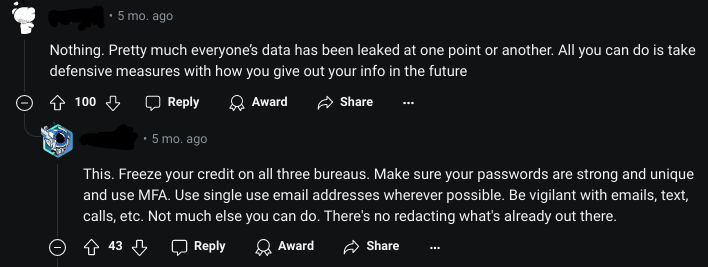Table of Content
- How Can I Check If My Identity Verification Information is on the Dark Web?
- What Should I Do to Protect My Information from Dark Web Leaks?
- How Did My Identity Verification Information Appear on the Dark Web?
- Is It Possible to Remove My Identity Verification Information from the Dark Web?
- Frequently Asked Questions (FAQs)
- Wrapping Up
If you know about the dark web, then you might be scared that hackers or creeps can use the platform to steal your online identity and get access to financial accounts.
The dark web, a hidden and illicit part of the internet, can expose identity verification details, leading to serious privacy risks and potential misuse.
And it won’t stop there.
A massive data leak hit National Public Data in August that exposed private information of nearly every American. The breach includes names, contact details, SSN (Social Security Number), addresses.
This guide explains how identity verification details can end up on the dark web, the potential dangers, and how you can protect your information.
How Can I Check If My Identity Verification Information is on the Dark Web?
The short answer is: You can’t!
Unless you use the Tor browser or some other ways to use the dark web. And even if you know how to use the dark web, the best course of action is to change passwords or lock your banking accounts.
To find out if your identity verification information is on the dark web, you can use a dark web monitoring tool. These tools scan the dark web for personal data like your name, address, or ID number.
What Should I Do to Protect My Information from Dark Web Leaks?
If you discover that your identity verification information is on the dark web, follow these steps to protect yourself:

Change Your Passwords
- Change the passwords for any accounts linked to your identity verification information immediately.
- Use strong, unique passwords and a password manager to store them securely.
Enable Multi-Factor Authentication (MFA)
- MFA enhances security by requiring extra verification, like a code or fingerprint scan, even if someone has your login details.
Monitor Your Financial Accounts
- Monitor your bank accounts and credit reports for suspicious activity. Get a free credit report from Experian, TransUnion, and Equifax at AnnualCreditReport.com.
- Report any unauthorized transactions or new accounts to your bank and credit bureaus immediately.
Scan Your Computer for Malware
- Run an antivirus scan to check for malware, which can leak personal information to the dark web.
How Did My Identity Verification Information Appear on the Dark Web?
Your identity verification information could end up on the dark web through various methods, including:
Data Breaches
Companies that store your personal information may experience data breaches, leading to your information being exposed.
Malware
Malicious software installed on your device can steal your personal information and post it on the dark web.
Phishing
Cybercriminals may trick you into revealing your information through fake emails or websites, which then get sold on the dark web.
Is It Possible to Remove My Identity Verification Information from the Dark Web?
Unfortunately, once your information is on the dark web, it’s nearly impossible to remove it. The most effective approach is to take preventive steps, such as using dark web monitoring tools, regularly updating your passwords, and being wary of phishing emails.
However, you can stay a step ahead of cybercriminals with dark web monitoring on your device. Even though you can’t stop anyone from leaking your information on the dark web, you will get an alert notification whenever someone posts your data without consent.
PurePrivacy helps you protect your personal information with a range of privacy-focused features:
- Use Dark Web Monitoring to scan the dark web to see if your personal information is being shared.
- Use Tracker Blocker to prevent online tracking and data collection.
- Use the Remove My Data feature to automatically send requests to remove your information.
- Use Social Privacy Manager to enhance your privacy on social media platforms.
Monitor the Dark Web 24/7
Use Dark Web Monitoring to get alerts whenever your personal information is detected on the dark web.
Block Trackers and Data Collection
With PurePrivacy, you can stop unauthorized access and prevent hidden trackers from collecting your data.
Automate Your Opt-Out Requests
Send automated requests to data brokers to minimize the exposure of your personal information.
Boost Your Social Media Privacy
Strengthen your privacy settings on social media to protect your personal information from being exposed.
Frequently Asked Questions (FAQs)
-
What does it mean if my identity verification information is found on the dark web?

If your identity verification information is found on the dark web, it means that your personal details, such as your name, address, Social Security number, or government-issued ID, have been exposed and are potentially being sold or traded by cybercriminals.
-
How can my identity verification information end up on the dark web?

Your identity verification information can end up on the dark web through data breaches, phishing scams, or malware infections. Hackers can also obtain this information through other illegal activities and sell it on the dark web.
-
What should I do if my identity verification information is found on the dark web?

If you find out that your personal information has been leaked online, you should immediately change your passwords, enable two-step verification, monitor your financial accounts, and scan your devices for viruses. To help you stay safe, you can also use PurePrivacy's Dark Web monitoring feature.
Wrapping Up
It's more important than ever to keep your personal information safe online because there are more and more malicious actors trying to steal it.
By using PurePrivacy with a VPN, you can protect your personal information from cybercriminals who steal identities and sell it on the dark web.






